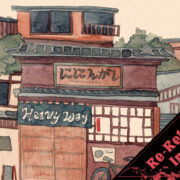Walker Phillips 

Typically Guerssen is a wellspring of reissues, but they have a handful of new artists that follow suit on their dedication to mapping the contours of the ‘60s and ‘70s. Case in point, the second album from San Francisco songwriter Walker Philips aims to emulate the arc of folk as it embraced the progressive itch of the late ‘60s. The first side is littered with soft strums, hand drums, and delicate curlicues of flute. Touches of Donovan, The Lemon Pipers, Jan Dukes De Gray, Forest, and the Monkees’ more psychedelic years permeate the bulk of the album. Gotta admire Walker’s dedication to the balance of bubblegum and psych here. This era boasted a lot of works that sought the connection to the kernel of psychedelia, but still held tight to the kind of manufactured pop that had predated the slide into progressive waters. The industry was practically tripping over itself trying to keep up with the cultural shift and some of my favorite moments from that era wind up straddling the pop-psychedelic line.
Sure, there’s something to be argued for the kind of records that were truly pioneering and lead by artists’ unwavering dedication to conciseness expansion, but sometimes ‘not quite getting it’ yielded surprisingly great pop results. Though, for every “Echoes of Time” there’s bound to be a “Ye Olde Toffee Shoppe.” Phillips does an admirable job of keeping the needle just a touch towards the sublime rather than the silly. He’s got a foot more firmly in that former camp and it works because his sincerity carries the album, feeling very much like someone touched by the source material — seeking to emulate the balance between the mystic, the rustic, and the whimsical. The album, like so many of its predecessors, succeeds with an attention to detail and a bit of indulgence, letting soaring harmonies, warm production, and an experimental nature guide its hand. The second side might be the most deserving of the indulgence nods, aiming for jazz-flecked psych and reportedly inspired by Bitches Brew, but landing a bit closer to Jan Dukes De Gray’s winding folk epics that sometimes got a bit lost in themselves. Still, God’s Eye is a fun listen, and one that’ll probably find a home with those seeking out the original hidden gems that have informed it so well.
Support the artist. Buy it HERE.








